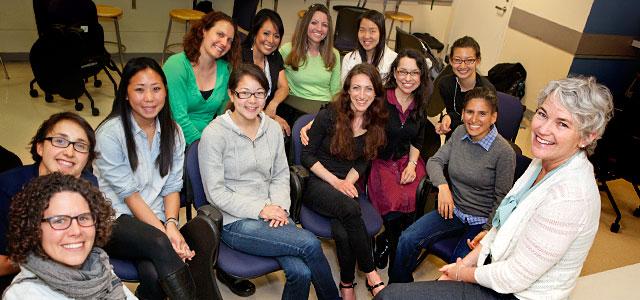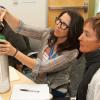
Maureen McGrath, right, with her class (photos by Elisabeth Fall)
National Leader to Direct Diabetes Minor
When in the fall of 2012 UCSF School of Nursing received a $1.5 million gift to begin a minor in diabetes – one of the few of its kind in the country – there was a national search to find the appropriate director. That search led to an alumna and former UCSF clinician: pediatric nurse practitioner (PNP) Maureen McGrath.
In the 1990s, as a newly minted PNP, McGrath had helped revamp the Diabetes Clinic at UCSF Medical Center. Since that time, as one of a small group of clinicians nationwide who are board certified in advanced diabetes management, she has been among those defining the NP’s role in managing a disease that afflicts 26 million Americans and 347 million people worldwide. Diabetes is also a major cost driver in a health care system struggling to deliver care more efficiently.
“Maureen was a wonderful partner in developing our revitalized pediatric program in the early ’90s in response to the Diabetes Control and Complications Trial [DCCT],” says pediatric endocrinologist Stephen Gitelman, co-director of the Madison Clinic for Pediatric Diabetes at UCSF. “She doesn’t shy away from the toughest problems or the most difficult cases – she embraces them – and something magical happens behind closed doors when she takes a sullen, angry teen and talks them through what they need to do to emerge in a more functional place with their diabetes.”
A Patient Before Becoming a Nurse
McGrath, who has been managing her own type 1 diabetes since age 12, did not set out to become a nurse. But after graduating with a psychology degree from UC Berkeley, she became a subject in a multicenter National Eye Institute study on the treatment of diabetic retinopathy, a diagnosis she received at age 19.
After the principal investigator met her, McGrath became an assistant researcher on the project and then a research coordinator, a position in which she found herself doing everything from literature reviews to presentations at conferences.
It was her first significant dive into the world of health care, and she spent a lot of time with the advanced practice nurses who were her fellow research coordinators. She found herself inspired by the work they did, though nursing was not yet on her radar.
In 1991, she became director of Bearskin Meadow Overnight Camp, where she’d been working in various roles since 1983 and where patients and staff work on diabetes management 24/7. “After I took that job, I began thinking I might get a master’s in public health, but then [UCSF Diabetes Teaching Center RN] Rae Jayne, who was interviewing me for her PhD project on self-regulation in diabetes, told me about this new program that she thought I would be perfect for.”
The program was the newly created UCSF Master’s Entry Program in Nursing (MEPN). McGrath deferred her entrance for a year to continue her year-round role as a camp director, but she says, “Ultimately, I decided I needed to get a professional license so I could really delve into managing the disease.”
After completing her RN and beginning her master’s in the PNP program, McGrath took a job at the Diabetes Teaching Center at UCSF. When she completed her PNP credential in 1995, she became a clinician in the UCSF Diabetes Clinic.
Her timing was fortuitous, for partly in response to findings from the DCCT, UCSF was intensifying its efforts to provide diabetes management through a multidisciplinary team focused on patient and family education. It was a perfect fit for McGrath’s background, and she was awarded a yearlong diabetes fellowship privately funded by Dorothy Frank – the first nurse or NP to receive this award.
“People began to understand the other side of diabetes treatment, the critical piece of helping people learn to live with their disease, something nurses and NPs are particularly well suited to do,” she says.
Gitelman agrees. “As a physician, you grow up with this model of writing a prescription, pushing paper across the desk and assuming if patients take their medicine, they’ll be fine. But diabetes is a different matter, because in order to have patients who can figure out their blood sugar and deliver the right amount of insulin, they have to integrate a lot of information. This type of care is best delivered in context of a team, with the patient and family at the center and the nurse educator as a very, very important component. The NP is at the interface of all other personnel involved, educates in a way that would elude the majority of physicians and understands how to maximize a patient’s long-term care.”
On to Atlanta
After six years at the UCSF clinic, McGrath moved on to the Emory-Children’s Center Division of Pediatric Endocrinology and Diabetes in Atlanta. She found that Emory policies afforded NPs more independent practice and billing; in turn, in over a decade at Emory, McGrath helped forge new roles for NPs in the clinic there.
“By the time that I left Emory, the three NPs were seeing about 60 percent of the 1,500 patients [annually],” she says.
In addition, McGrath was designated an attending in a weekly clinic for second-year physician fellows, so these endocrinologists-in-training could receive more exposure to the day-to-day treatment of diabetes.
“The fellows would see patients and then present the pertinent history, physical exam and treatment plan to me, and I would discuss their evaluation with them and the family,” she says. “This model is rare. It depends on the physician colleagues’ trust in the NP’s ability.”
Instituting the Minor
 McGrath was happy at Emory, but when she became aware that UCSF had posted a clinical faculty position to direct its new diabetes minor, she was intrigued. “I’d be in clinic one day a week, but I’d also be using my talents and background in new ways,” she says. “Then my husband got a job in San Francisco and all the stars aligned.”
McGrath was happy at Emory, but when she became aware that UCSF had posted a clinical faculty position to direct its new diabetes minor, she was intrigued. “I’d be in clinic one day a week, but I’d also be using my talents and background in new ways,” she says. “Then my husband got a job in San Francisco and all the stars aligned.”
She returned to the Bay Area in November 2012. “Maureen has been at the forefront of changes in diabetes care,” says Catherine (Kit) Chesla, who led the search committee to find a director. “She’s exquisite as a clinician and at training practitioners in diabetes management, and we know we are very lucky to have her.”
Because the clinical training and curriculum involve a collaboration among the schools of nursing and medicine, McGrath has a joint appointment in both schools. This winter she spent the bulk of her time co-teaching the initial course on the behavioral aspects of diabetes management with Chesla. The class gives students advanced skills, including ways to systematically assess patients and conduct motivational interviews, problem solve and negotiate with patients and families.
“Having these tools is very important to whether a child or adult does well in relation to diabetes,” says Chesla.
“What’s been very exciting is the level of interest and excitement from this initial group,” says McGrath. The class drew 16 students from various disciplines – adult, pediatric, family and psychiatric NPs as well as a public health nurse.
Now she must develop the rest of the courses for when the minor begins in the fall. Though there will be a certain number of spots for designated fellows, the three-course sequence will be open to all students in an effort to successfully increase awareness of diabetes management in many of the School’s graduates.
“My hope is to share my passion around diabetes – to ignite and inspire these nurses to take care of people with diabetes over a life span,” says McGrath.
Note: Maureen McGrath and the idea of training nurse practitioners to manage diabetes were highlighted at NBC Los Angeles on April 7, 2013.



